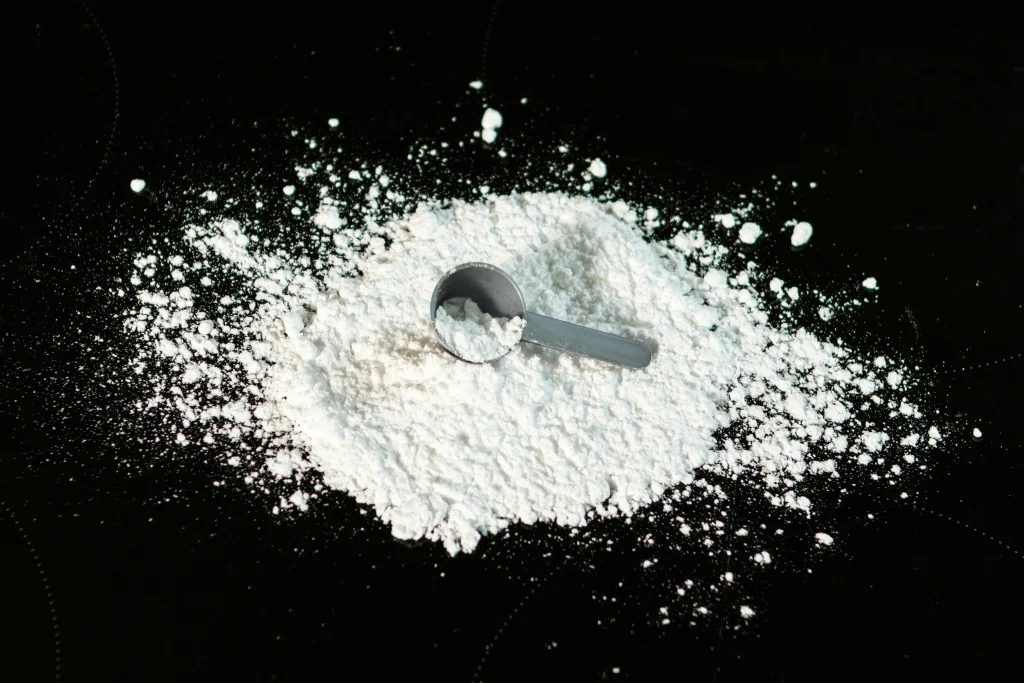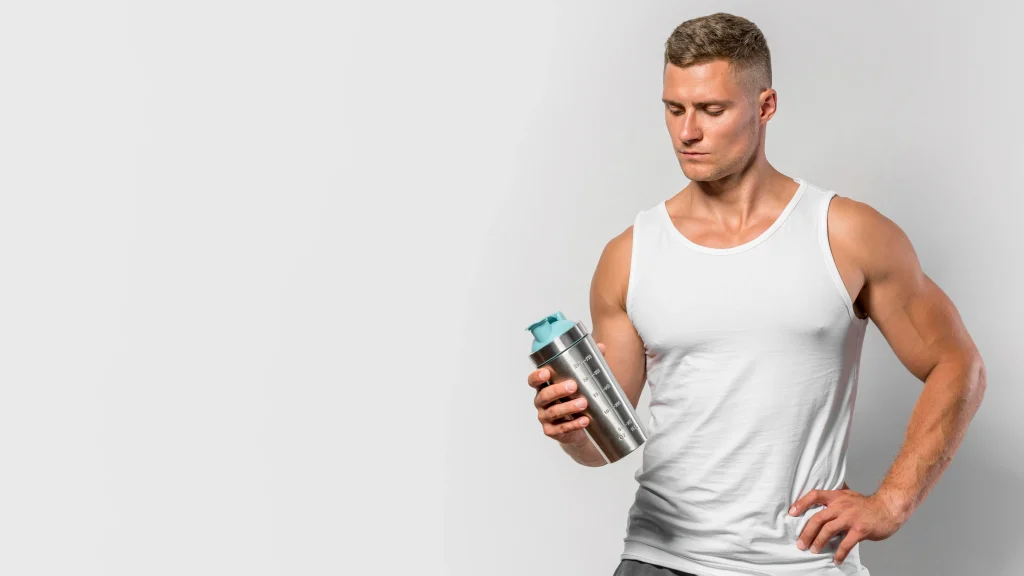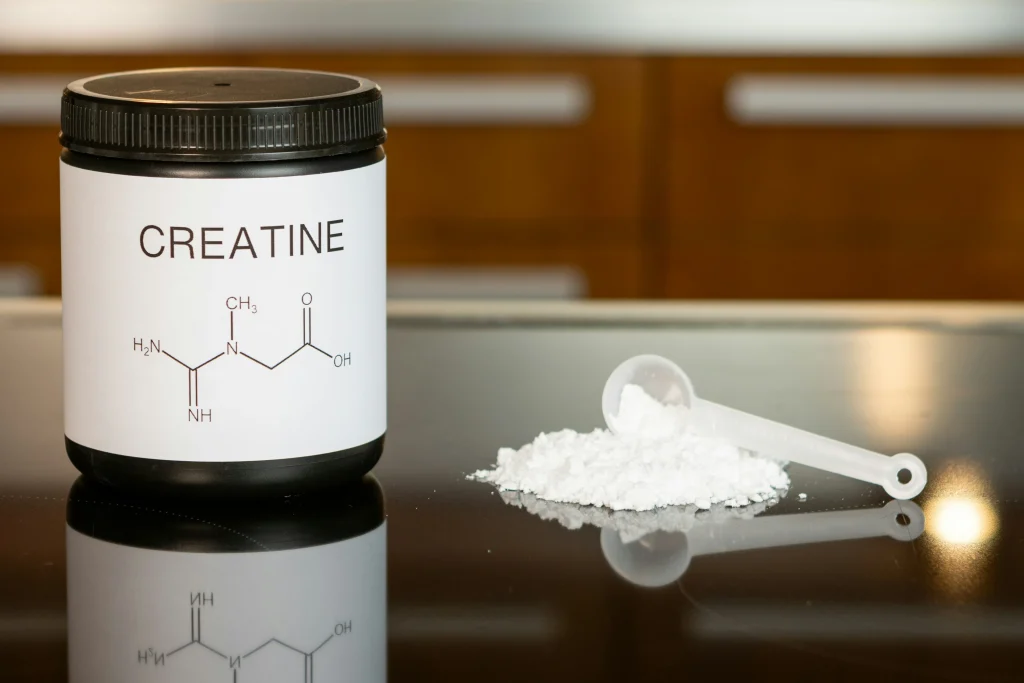
Creatine is the go-to for energy and muscle gains, yet concerns about its link to hair loss are widespread. Let us separate myths from facts by examining scientific evidence, to clarify the true effects of creatine on hair health and whether creatine can make you bald.
Can Creatine Cause Hair Loss?

Creatine does not directly cause hair loss. This misconception largely stems from a 2009 study by van der Merwe et al. that noted a slight increase in dihydrotestosterone (DHT) levels—a hormone implicated in male pattern baldness—following creatine supplementation in rugby players.
However, this increase in DHT was minor and within healthy ranges, similar to the natural DHT fluctuations that can result from exercise. Thus, avoiding creatine for fear of hair loss overlooks the fact that everyday activities, like working out, also affect DHT levels.
What is the Source of the Link between Creatine and Hair Loss?
The 2009 study is central to the debate on creatine and hair loss, having observed that creatine increases DHT levels in the bloodstream. However, it’s crucial to understand the nuances:
Does Creatine Increase DHT?
The concern with DHT relates to its ability to shrink hair follicles in those genetically predisposed to hair loss. Yet, the study measured DHT levels in the blood, not in the follicle where it could directly cause hair loss.
Study Criticisms
Critics argue that the study’s focus on serum DHT fails to directly correlate with hair loss, as hair follicle DHT is the true culprit.
Additionally, the small sample size and the lack of replication in further studies weaken the argument that creatine supplementation leads to baldness.
Subsequent Research
Despite the initial findings, no further research has definitively linked creatine use with hair loss.
The scientific studies conducted since then have not found creatine to cause hair loss, reinforcing the idea that its supplementation is safe in terms of hair health.
Reevaluating the Evidence
Given the lack of direct evidence linking creatine to hair thinning or loss, and considering the safety and efficacy of creatine supplementation, particularly in enhancing exercise performance, the notion that creatine causes baldness appears to be unfounded.
It’s important for individuals predisposed to hair loss to understand that the impact of creatine on hair health is minimal compared to its benefits for muscle building and cognitive function.
This reevaluation based on scientific evidence suggests that concerns over creatine and hair loss might be more rooted in myth than fact.
What Causes Hair Loss and What are the Prevention Strategies?
Hair loss, a common concern affecting many, can stem from various factors including genetics, hormonal changes, stress, and lifestyle habits. Understanding these causes and adopting effective prevention strategies can help manage and potentially reduce hair loss.
What Are the Causes of Hair Loss?
Genetics: The most common cause of hair loss is androgenic alopecia, often referred to as male pattern baldness or female pattern hair loss, dictated by one’s genetic predisposition.
Hormonal Changes: Hormones, particularly dihydrotestosterone (DHT), play a significant role in hair thinning and loss. Conditions like thyroid imbalances can also contribute.
Stress: Both physical and emotional stress have been known to trigger hair loss, known as telogen effluvium, pushing hair follicles into a resting phase.
Lifestyle Factors: Diet, exercise, and sleep quality can impact hair health. Poor nutrition, lack of exercise, and inadequate sleep can exacerbate hair loss.
General Prevention Strategies
To prevent hair loss or manage its progression, consider the following strategies:
Diet and Nutrition: Consume a balanced diet rich in vitamins and minerals. Prevent hair loss by ensuring adequate intake of iron, zinc, vitamin D, and protein, which are crucial for hair growth.
Stress Management: Techniques such as meditation, yoga, and regular exercise can help manage stress levels, potentially reducing the impact on hair health.
Proper Hair Care: Avoid harsh treatments and styles that pull on the hair. Use gentle, nourishing hair care products to maintain scalp health.
Natural and Medical Treatment Options
If you are experiencing hair loss, several treatment options are available:
Natural Remedies: Biotin, saw palmetto and essential oils like rosemary and peppermint have been cited for their potential to support hair health.
Medical Treatments: Minoxidil (Rogaine) and finasteride (Propecia) are FDA-approved treatments that can slow hair loss and promote regrowth for some individuals.
Advanced Therapies: Procedures such as hair transplants, laser therapy, and platelet-rich plasma (PRP) injections offer advanced options for managing hair loss.
What Are the Scientifically Proven Side Effects of Creatine?

Creatine is widely researched for its performance-enhancing benefits and safety profile.
While it’s generally considered safe for healthy individuals, there are some side effects associated with its use, although these are typically mild and manageable.
Water Retention: Creatine is an osmotically active substance. Therefore, it can cause the muscles to hold more water, leading to a slight weight gain. This is often temporary and diminishes as the body adjusts.
Digestive Issues: Some individuals may experience digestive discomfort, including bloating or diarrhea, particularly at higher doses during the creatine loading phase.
Kidney and Liver Function: Concerns about the impact of creatine on kidney and liver function have been raised, but scientific studies largely indicate that creatine supplementation is safe for these organs in healthy individuals. However, those with preexisting conditions should consult a healthcare provider.
Muscle Cramping and Strains: Anecdotal reports suggest that creatine use may lead to muscle cramps or strains, although there is limited evidence to suggest that creatine directly causes these issues.
How Can You Manage the Side Effects?
To minimize potential side effects, consider the following guidelines:
Hydration: Increase water intake to help mitigate water retention and support kidney function.
Gradual Dosing: Opt for a gradual increase in creatine intake rather than a high-dose loading phase to reduce digestive discomfort.
Quality Products: Choose high-quality creatine supplements to ensure purity and minimize contaminants that could contribute to adverse effects. Creatine monohydrate stands out as one of the safest and most extensively studied variations of creatine supplements.
Consultation: Speak with a healthcare provider before starting creatine, especially if you have existing health concerns or are taking other supplements or medications.
In a few words:
Creatine’s side effects are generally mild for most people, and with proper management, it remains a popular and effective supplement for enhancing exercise performance and muscle growth. As with any supplement, individual experiences may vary, highlighting the importance of tailored advice from a healthcare professional.
Conclusion
In conclusion, there is no conclusive evidence linking creatine supplementation to hair loss. Scientific research, while exploring creatine’s effects on DHT levels, has not established a direct cause-and-effect relationship affecting hair health.
If you are considering creatine, it’s essential to use it responsibly, focusing on quality products and recommended dosages. Consult a health professional before taking creatine, if you have kidney and liver issues.
FAQs
Does creatine have side effects?
Yes, creatine does have side effects, though they are generally mild and manageable. These include water retention, digestive issues, and potentially increased muscle cramping. Most side effects can be minimized with proper hydration and correct dosing.
Is creatine natty or not?
Creatine is considered “natty,” or natural, as it is found in small amounts in foods like meat and fish and is also produced naturally by the body. Supplementing with creatine is seen as enhancing natural body processes rather than introducing synthetic or external hormones.
Does creatine help the beard grow?
There is no direct evidence suggesting that creatine helps beard growth. Beard growth is largely determined by genetics and hormone levels, particularly testosterone and DHT, but creatine’s primary effect is on muscle energy production.
Is creatine good for hair?
There is no scientific evidence to suggest that creatine is beneficial for hair in the context of promoting hair growth or health. The primary benefits of creatine are related to muscle energy and possibly cognitive function.
Does creatine make hair grow?
Creatine does not directly influence hair growth. While it affects energy metabolism in muscle cells, there’s no conclusive evidence linking it to increased hair growth on the scalp or body.
Does creatine affect DHT?
Yes, creatine can affect DHT levels. The 2009 study on rugby players showed a slight increase in DHT levels after creatine supplementation. However, the increase was within normal ranges, and its impact on hair loss is not definitively proven.
Does creatine affect sleep?
There is limited research suggesting that creatine affects sleep directly. Some individuals report changes in sleep patterns when supplementing with creatine, but these effects are not widely documented or understood in scientific literature.